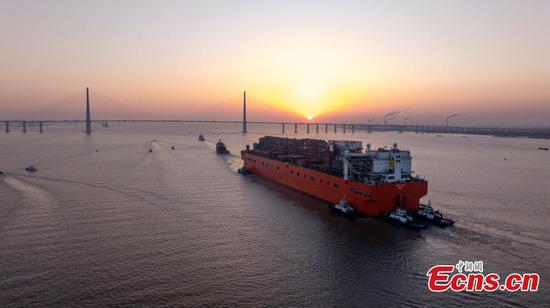China's first large-scale FLNG facility completes domestic transfer for further assembling

The "NGUYA FLNG," a floating liquified natural gas (FLNG) facility, is tugged through the Sutong (Suzhou-Nantong) Bridge across the Yangtze River in east China's Jiangsu Province, Dec. 9, 2024. (Photo provided to China News Service)
China's first large-scale floating liquified natural gas (FLNG) facility "NGUYA FLNG" on Wednesday completed domestic transfer from Nantong of Jiangsu Province to Zhoushan of Zhejiang Province, both in East China, for further assembling, integrating and modulating, another milestone of China's marine engineering equipment development.
The NGUYA FLNG measures 376 meters in length, 60 meters in width, and 35 meters in depth. It occupies a large area of the navigable waterway and is significantly affected by wind and currents during the transfer. The transfer began along the Yangtze River amid the annual low water period, which made the operation more difficult, China News Service reported.
In order to secure the normal operation of the transfer, the local waterway supervisor set special navigation marks, and deployed drones and multi-beam sonar for precise measurement of waterway depth and environment condition in advance.
FLNG is a floating liquefied natural gas processing platform that can directly liquefy and store extracted natural gas in offshore areas far from land. It is one of the most complex and high-value-added facility in the marine engineering equipment sector.
The NGUYA FLNG can receive approximately 10.76 million cubic meters of natural gas daily from nearby gas fields when operating at full capacity, making it a "new crown jewel" of the maritime engineering industry, according to the report.
In the first three quarters of 2024, China's marine engineering equipment manufacturing industry has maintained a sound, steady performance, with the amount of newly contracted marine engineering orders up 167 percent year-on-year and the amount of outstanding orders increasing 17.8 percent year-on-year, China's Ministry of Natural Resources said on October 31, 2024.
